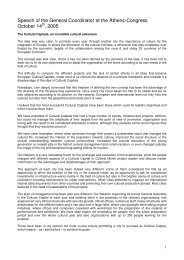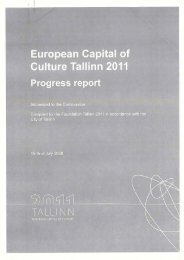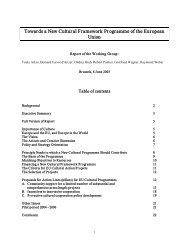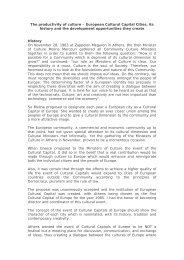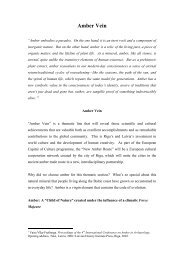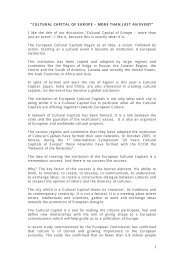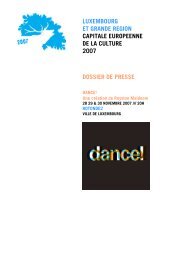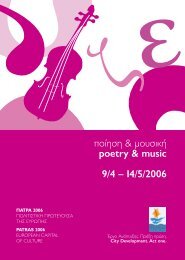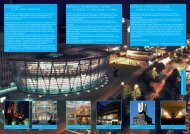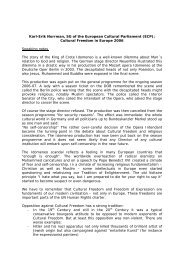Concise.pdf - Brugge Plus
Concise.pdf - Brugge Plus
Concise.pdf - Brugge Plus
- No tags were found...
Create successful ePaper yourself
Turn your PDF publications into a flip-book with our unique Google optimized e-Paper software.
Introduction<br />
Global strategy<br />
The commercial management of BRUGGE 2002 was based on a strategy with four<br />
main themes:<br />
1. Constant monitoring of the financial situation to allow immediate adjustments<br />
where necessary.<br />
2. Risk management through legally underpinned and fiscally sound agreements.<br />
3. Effective and cost-conscious staff policy.<br />
4. Clear internal and external communication of financial policy.<br />
This strategy had to be implemented in an extremely complex context, given the<br />
scope of the project, the time restrictions and the number of employees and partners.<br />
Concrete interpretation of commercial policy<br />
Financial component<br />
When Katrien Van Eeckhoutte became Financial and HR manager of BRUGGE 2002<br />
in February 2000, BRUGGE 2002 vzw had contracted its bookkeeping out to the firm<br />
Fisko Data, which conducted financial policy remotely. From March 2000 the bookkeeping<br />
was monitored internally by an administrative employee. During this period the<br />
budgetary plan was refined. Each activity and head of department was given a part-budget.<br />
Because of the limitations of the bookkeeping system at the time it was decided to<br />
organise the monitoring of the budget on a statistical basis. In the spring of 2000 the<br />
organisation pressed on with the development of a Project Management Information<br />
System (Promis) that allowed the most important practical and budgetary information<br />
to be centralised for each project.<br />
In summer 2001, three more members were added to the financial team.<br />
Every two months a financial report was submitted to the Board of Directors. After<br />
being externally audited by the company auditor the annual accounts were submitted<br />
to the General Meeting for approval before the end of March.<br />
73<br />
CONCISE<br />
From October 2001 BRUGGE 2002 began advance sales of tickets for the various cultural<br />
events. Tickets were sold using the TicketTinck system, a new IT development for the<br />
Province of West Flanders, for which BRUGGE 2002 acted as pilot project. In September<br />
2001 a ticket co-ordinator started, who was responsible for organising the efficient and<br />
reliable sale of tickets. He was assisted by a team of enthusiastic ticket sellers.<br />
Legal component<br />
Because of BRUGGE 2002’s extensive interaction with a large number of external partners,<br />
clear agreements are essential. Therefore in January 2001 a legal expert joined the<br />
organisation. She drafted hundreds of contracts with cultural partners, artists, companies,<br />
staff, sponsors and letters. Many fiscal and socio-legal matters were also dealt with.<br />
Staff component<br />
The non-profit organisation BRUGGE 2002 was established in 1999 and during its peak<br />
period developed into a medium-sized company with more than 100 employees, which<br />
implied an appropriate and labour-intensive staff policy. External partners were brought<br />
in, more specifically a social secretariat (ADMB) and a temp agency (chief sponsor<br />
Randstad). From September 2001 the temp agency took on an in-house consultant. In<br />
2002 the organisation was able to count on a full-time employee from the temp agency<br />
for temporary jobs on an interim basis and for the practical co-ordination of voluntary<br />
work. In December 2001 a staff co-ordinator was brought into the administration team.



